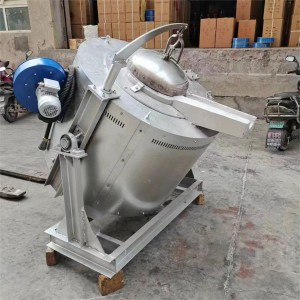Zinc Melting Furnace Energy Saving Type
Technical Parameter
Power Range: 0-500KW adjustable
Melting Speed: 2.5-3 hours/per furnace
Temperature Range: 0-1200℃
Cooling System: Air-cooled, zero water consumption
|
Aluminium Capacity |
Power |
|
130 KG |
30 KW |
|
200 KG |
40 KW |
|
300 KG |
60 KW |
|
400 KG |
80 KW |
|
500 KG |
100 KW |
|
600 KG |
120 KW |
|
800 KG |
160 KW |
|
1000 KG |
200 KW |
|
1500 KG |
300 KW |
|
2000 KG |
400 KW |
|
2500 KG |
450 KW |
|
3000 KG |
500 KW |
|
Copper Capacity |
Power |
|
150 KG |
30 KW |
|
200 KG |
40 KW |
|
300 KG |
60 KW |
|
350 KG |
80 KW |
|
500 KG |
100 KW |
|
800 KG |
160 KW |
|
1000 KG |
200 KW |
|
1200 KG |
220 KW |
|
1400 KG |
240 KW |
|
1600 KG |
260 KW |
|
1800 KG |
280 KW |
|
Zinc Capacity |
Power |
|
300 KG |
30 KW |
|
350 KG |
40 KW |
|
500 KG |
60 KW |
|
800 KG |
80 KW |
|
1000 KG |
100 KW |
|
1200 KG |
110 KW |
|
1400 KG |
120 KW |
|
1600 KG |
140 KW |
|
1800 KG |
160 KW |
Product Functions
Preset temperatures & timed start: Save costs with off-peak operation
Soft-start & frequency conversion: Automatic power adjustment
Overheat protection: Auto shutdown extends coil life by 30%
Advantages of High-Frequency Induction Furnaces
High-Frequency Eddy Current Heating
- High-frequency electromagnetic induction directly generates eddy currents in metals
- Energy conversion efficiency >98%, no resistive heat loss
Self-Heating Crucible Technology
- Electromagnetic field heats the crucible directly
- Crucible lifespan ↑30%, maintenance costs ↓50%
PLC Intelligent Temperature Control
- PID algorithm + multi-layer protection
- Prevents metal overheating
Smart Power Management
- Soft-start protects power grid
- Auto frequency conversion saves 15-20% energy
- Solar-compatible
Applications
Customer Pain Points
Resistance Furnace vs. Our High-Frequency Induction Furnace
| Features | Traditional Problems | Our Solution |
| Crucible Efficiency | Carbon buildup slows melting | Self-heating crucible maintains efficiency |
| Heating Element | Replace every 3-6 months | Copper coil lasts years |
| Energy Costs | 15-20% annual increase | 20% more efficient than resistance furnaces |
.
.
Medium-Frequency Furnace vs. Our High-Frequency Induction Furnace
| Feature | Medium-Frequency Furnace | Our Solutions |
| Cooling System | Relies on complex water cooling, high maintenance | Air cooling system, low maintenance |
| Temperature Control | Rapid heating causes overburning of low-melt metals (e.g., Al, Cu), severe oxidation | Auto-adjusts power near target temp to prevent overburning |
| Energy Efficiency | High energy consumption, electricity costs dominate | Saves 30% electric energy |
| Ease of Operation | Requires skilled workers for manual control | Fully automated PLC, one-touch operation, no skill dependency |
Installation Guide
20-minute quick installation with complete support for seamless production setup
Why Choose Us
- Construction:
- The furnace is composed of five main components: the furnace shell, furnace lining, electric control system, heating elements (resistance wires), and the crucible. Each component is designed for durability and efficient heat distribution.
- Operating Principle:
- This crucible-based furnace uses resistance heating elements to generate heat, which is radiated uniformly to melt and hold zinc or other materials. The metal is placed in a crucible, which is then heated evenly for effective melting and temperature control.
Design Features:
- Capacity: The standard furnace has a 500kg capacity, but can be customized to suit specific requirements.
- Melting Rate: The furnace is capable of melting at a rate of 200kg per hour, providing efficient performance for high-volume operations.
- Process Temperature: The working temperature range is 730°C to 780°C, ideal for melting zinc and other low-melting-point alloys.
- Compatibility: The furnace is designed to work with 550-800T die-casting machines, ensuring smooth integration into existing production lines.
Structural Design:
- Melting Furnace: The furnace consists of a melting chamber, crucible, heating elements, a furnace cover lifting mechanism, and an automatic temperature control system.
- Heating System: Utilizes resistance wires for uniform heating, ensuring consistent melting performance.
- Automation: The furnace is equipped with an automatic temperature control system, providing precise and stable temperature management for optimal melting and holding.
The Zinc Melting Furnace is ideal for manufacturers focused on efficiency, precision, and metal quality, particularly in industries requiring zinc and other low-melting-point alloys. This system can also be integrated with a casting platform and other specialized equipment to create a comprehensive metal casting setup.
Why Choose an Induction Melting Furnace?
Unmatched Energy Efficiency
Have you ever wondered why induction melting furnaces are so energy-efficient? By inducing heat directly into the material rather than heating the furnace itself, induction furnaces minimize energy loss. This technology ensures that every unit of electricity is utilized efficiently, translating into significant cost savings. Expect up to 30% lower energy consumption compared to conventional resistance furnaces!
Superior Metal Quality
Induction furnaces produce a more uniform and controlled temperature, leading to a higher quality of the molten metal. Whether you're melting copper, aluminum, or precious metals, the induction melting furnace ensures that your final product will be free of impurities and have a more consistent chemical composition. Want high-quality casts? This furnace has got you covered.
Faster Melting Time
Do you need faster melting times to keep your production on track? Induction furnaces heat metals quickly and evenly, allowing you to melt large quantities in less time. This means faster turnaround times for your casting operations, increasing overall productivity and profitability.
Frequently Asked Questions
Q1: How much energy can I save with an induction melting furnace?
Induction furnaces can reduce energy consumption by up to 30%, making them the go-to choice for cost-conscious manufacturers.
Q2: Is an induction melting furnace easy to maintain?
Yes! Induction furnaces require significantly less maintenance compared to traditional furnaces, saving you time and money.
Q3: What types of metals can be melted using an induction furnace?
Induction melting furnaces are versatile and can be used for melting ferrous and non-ferrous metals, including aluminum, copper, gold.
Q4: Can I customize my induction furnace?
Absolutely! We offer OEM services to tailor the furnace to your specific needs, including size, power capacity, and branding.

Our Team
No matter where your company is located, we are able to offer a professional team service within 48 hours. Our teams are always in high alert so your potential problems can be solved with military precision. Our employees are constantly educated so they are up to date with current market trends.















